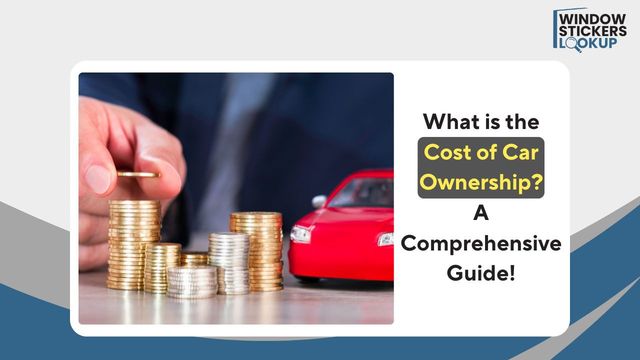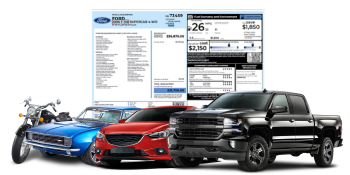Owning and operating a new car is becoming more expensive; on average, the monthly cost of ownership is over $1,000. Several online driving cost calculators can help car buyers calculate and compare costs when searching for vehicles.
According to a 2022 Consumer Expenditures by The U.S. Department of Labor (U.S. Bureau of Labor Statistics), the average yearly cost to own and operate a vehicle is $11,450. Other sources in 2023 put the yearly cost for a new car at $12,182.
Knowing the total cost of owning a car is wisdom-inclined, as it helps ensure you don’t outspend your budget. This article will provide the necessary information you need to know about owning a car, discuss common ownership costs, and provide actionable plans to save money on a car you love.
Read Also: Cheapest Tesla MSRP: What Is the Cheapest Tesla You Can Buy?
What is the true cost of car ownership?
The question, “What is the cost of car ownership?” can be best answered by knowing the actual amount it costs to purchase a car.
According to a Kelley Blue Book study in 2023, the average cost of a used car and a new car was $26,533 and $48,334, respectively. However, the sticker price is just one of several factors to be considered when owning a car.
Moreover, a 2022 study by the American Automobile Association (AAA) reported that the yearly cost of car ownership was $10,728, about an 11% increase from the previous year.
What are the Costs associated with car ownership?
To know the true cost of owning a car, there is a need to consider several other costs associated with buying and maintaining a car. They include the following:
1. Financing and Purchase Price
Experian estimated the average monthly loan payment for a new and a used car to be $726 and $533, respectively. The number of people who prefer to finance their automotive purchases has also decreased. To keep finance charges in check, people who are low on budget may choose to purchase a used car in good working condition.
READ ALSO: Car MSRP vs. Invoice: What You Should Know
2. Fuel
According to AAA, the average cost of petrol reached $3.27 per gallon in February 2024. In some states, like Hawaii, the current average fuel cost is as high as $4.70 per gallon. When determining the cost of gas, consider your driving and average weekly mileage. Understand that the more you drive, the higher the pump price.
3. Insurance
In 2024, the average annual cost of full car insurance coverage is $2,545. The cost may vary based on your location, vehicle type, insurance firm, driving records, and the coverage type you subscribed to.
You need to compare prices from various insurance providers to choose the appropriate coverage for your needs and budget. You can also speak with an expert to help you maximize your insurance coverage value.
4. Registration
Different states offer varying registration fees, and while some may collect a fixed price for any vehicle type, others may charge based on the vehicle’s age, weight, and power output. Depending on the state, the registration cost could range from as little as $25 to as high as $315. Ensure you contact your state’s Department of motor vehicles to know the amount required to register a vehicle in your state.
5. Depreciation
A new car starts to lose value once it’s driven off the lot, and various factors can affect its depreciation. These include the make and model, location, age, mileage, and maintenance. Usually, a new vehicle depreciates faster, and buying a used car can help slow down the rate of depreciation.
6. Maintenance
It’s quite difficult to know the real maintenance costs. However, keeping tabs on maintenance costs like oil changes, tire rotations, and wiper replacements can help you plan your budget. According to 2022 statistics by AAA, the average maintenance cost for a medium-sized sedan was about 10.64 cents per mile.
The maintenance cost may depend on the vehicle type, repair costs and driving rate. For instance, if you drive 12,000 miles annually, the maintenance cost will be around $1,300 and possibly increase as the vehicle ages, with little or no warranty coverage.
How to save on the total cost of owning a car
Take the following measures to keep your car ownership costs in check:
- Choose a car you can maintain
- Regularly maintain your car to prevent any significant breakdown
- Maximize driving trips
- Look for affordable car insurance
READ ALSO: Car Rebates Explained: Your Complete Guide to Getting Rebates
Replacing your car? The Pros and Cons
Changing your car to a new one may be outstanding, but it also comes with extra expenses. You should know the advantages and disadvantages of replacing your car.
Advantages of buying a new car
- A new vehicle usually demands less maintenance and repairs.
- It’s typically more fuel-efficient than an old car.
- It helps to meet family and transportation needs.
Disadvantages of buying a new car
- Your budget is likely to increase, regardless of whether the maintenance costs are
- Cars with advanced technology may attract costly repairs.
- Newer cars may demand higher registration costs.
If you’re buying a used vehicle, you should get a copy of the original window sticker for a snippet of the car’s fuel efficiency and original MSRP.
This will ensure you’re aware of the annual fuel cost and that you’re better off negotiating a good deal. You can easily walk away from the deal if the vehicle doesn’t suit your budget or meet your needs.
Frequently Asked Questions
How much does my car depreciate for the first five years?
Typically, a new car loses about 20% of its value in year one and will be worth 40% of what you paid after five years.
How Can You Reduce the Cost of Owning a Car?
You can choose to perform regular car servicing to save fuel. Besides, if the car is stretching your budget above the limit, you may consider buying a more fuel-efficient and low-cost maintenance car to save on repairs and fuel costs.
How Much Should I Spend on a Car?
A general guide is the 20/4/10 rule which advises that you put 20% down on a 4-year car financing and spend 10% of your income on transportation costs.
How do you calculate car depreciation?
This may differ depending on the car’s make and model; however, depreciation is estimated by taking the car’s initial value and applying the average percentage decrease to it each year you own it.
What cars have the lowest cost of ownership?
The top five cars with the lowest cost of owning include the following
Honda Civic – $5,480
Mini Cooper Convertible – $5,543
Toyota Yaris – $5,615
Toyota RAV4 – $5,618
Toyota Corolla – $5,627









